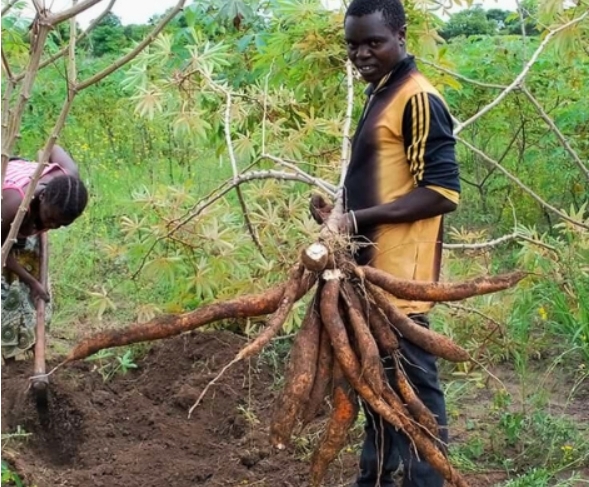Farmers in Nigeria are struggling with water shortages due to climate change, forcing them to rely on groundwater. Once-reliable rivers are drying up, leading to declining crop yields, particularly in the north. Smallholder farmers face increasing difficulties, with food security at risk. Experts warn of potential food, water, and health crises unless urgent interventions are made.
Nigerian Farmers Face Growing Struggles as Climate Change Dries Up Water Sources


Farmers across Nigeria are finding it increasingly difficult to access sufficient water for their crops. Riverbeds are drying up, leaving many with no option but to rely on groundwater through pumps. The growing water crisis is widely attributed to climate change, with conservationists warning of a potential food shortage if urgent irrigation support is not provided.
The ground is cracked and parched—where once there was a river and a lake, only dryness remains.
These are the harsh conditions confronting farmers in Nigeria today. Many believe the worsening situation is the result of climate change. In northwestern Nigeria, Nasiru Bello has worked his farmland for over 20 years. Now, he finds himself battling to secure water for his crops. A muddy puddle is all that remains of a river that once sustained his five-hectare farm and others in the Kwalkwalawa community of Sokoto State.
"All these things are a result of climate change," Bello says. "In previous years, we never experienced rivers drying like this. But now, because of climate change, they’re completely dry. Many people have counted their losses over the years because they depended solely on the river for irrigation."
Despite the odds, Bello continues to plant leeks in the dry soil. "I’m facing a lot of difficulties because I no longer use the river," he explains. "Now I use a well, but sometimes the well dries up while you're still using it. Then you have to dig another one—and that’s not easy. It costs money to dig each well. On top of that, you need money to run generators to power the pumps. Many of us don’t have that kind of money, so we just manage the old ones until we can afford new ones."
Climate change is having a profound impact on agriculture in Nigeria, Africa’s most populous country. The effects are particularly severe in the north, which produces about 70% of the country's food. As northern farmers struggle with diminishing water supplies, food prices and availability are being affected in the rapidly growing southern cities like Lagos, which has a population exceeding 21 million.
Farmers report that previously reliable water sources are now drying up. Compounding the issue is the fact that over 80% of Nigerian farmers are smallholders, who contribute 90% of the nation's agricultural output. Many of them work their fields with basic tools—sometimes just hand-carved wood and their bare hands. Nigeria’s primary cereal crop, maize, experienced a decline in cultivated land from 6.2 million hectares in 2021 to 5.8 million in 2022, according to AFEX, a licensed commodities exchange.
One of the most visible symbols of environmental change is Lake Chad in northeastern Nigeria, which has shrunk by about 90%. While less data exists for smaller rivers and lakes across the north, local farmers attest that they, too, are vanishing.
In another part of Sokoto State, farmer Umoru Muazu is preparing to plant crops without the assurance of a successful harvest. "When we first started, we had enough water," he recalls. "Now there’s none. We have to dig wells to continue irrigating, except during the rainy season. Even then, the water doesn’t last like it used to. It dries up earlier now. We’re forced to dig wells just to keep working."
Nigeria is projected to become the world’s third most populous country by 2050—behind only India and China and on par with the United States. Experts are raising alarms about how diminishing agricultural productivity will affect food security.
Dr. Isa Yusuf-Sokoto, an environmentalist at Umaru Ali Shinkafi Polytechnic in Sokoto, says, “The drying of rivers, lakes, and streams in recent decades is due to climate change, which is here to stay. Sokoto State’s semi-arid geography makes it especially vulnerable to desertification and other climatic issues. That’s why farmers are now complaining of drought.”
He notes that studies show two-thirds of the region’s trees are now gone, contributing to rising temperatures. “If there’s no urgent intervention for farmers, there will be a crisis—food crisis, water crisis, even health crisis. All of these are consequences of climate change.”
The decline in farm productivity is already being felt in other parts of the country. In the second quarter of 2024, agriculture contributed 22% to Nigeria’s GDP, a drop from 25% in the previous quarter. Meanwhile, food imports have surged to their highest level in five years, according to the national statistics agency.
With Nigeria’s population expected to hit 400 million by 2050, the United Nations Food and Agriculture Organization is promoting climate-smart agriculture to ensure long-term food security. The Nigerian government has also tasked agricultural research institutes with finding viable solutions.
But for now, farmers like Bello and Muazu must keep trying to cultivate crops in increasingly dry and difficult conditions.

 বাংলা
বাংলা  Spanish
Spanish  Arabic
Arabic  French
French  Chinese
Chinese 
